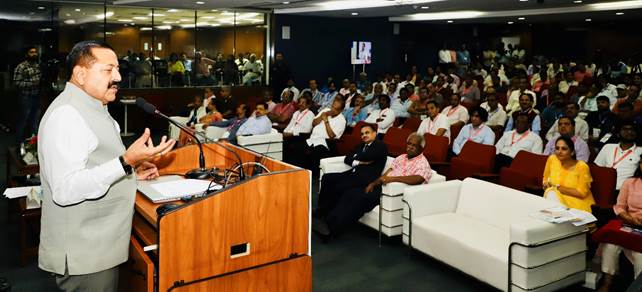

Union Minister Dr Jitendra Singh says, India has developed the world's latest Steel Road technology.
India has developed the world’s latest Steel Slag Road Technology which enables the large-scale utilization of waste slag from steel plants for the construction of roads, Union Minister of State (Independent Charge) Science & Technology Dr Jitendra Singh announced today.
He informed that CSIR-Central Road Research Institute (CRRI), New Delhi has pioneered the development of the revolutionary technology which has been successfully tested on three roads.
Surat in Gujarat became the first city in the country to get a processed steel slag road built as part of a joint-venture project by the Council of Scientific and Industrial Research (CSIR), Union Ministry of Steel and Arcelor Mitttal Nippon Steel at Hazira, the minister disclosed. Slag is made up of impurities melted out of the ore during the steel-making process in most steel plants.
Dr Jitendra Singh said steel slag technology for paving roads is in tune with Prime Minister Narendra Modi’s “Waste to Wealth” mantra.
“This innovative technological initiative also addresses the problem of environmental degradation caused by waste steel slag and unsustainable mining and quarrying of natural aggregates. CRRI has developed several key technologies for sustainable utilization of waste materials in road construction”, he said.
The stretch of six-lane road experimentally paved with steel slag in Surat has been shown to resist beating from weather as well as from thousands of heavy trucks, even though the surface is 30% shallower than that of roads paved with natural aggregates.
The Border Roads Organisation (BRO) also used steel slag to construct a long-lasting heavy-duty road at Arunachal Pradesh along the India-China border area. The steel slag material was given by Tata Steel Ltd free of cost and transported from Jamshedpur to Arunachal Pradesh by Indian Railways free of cost.
Besides, India’s largest road building agency, National Highway Authority of India successfully tested the steel slag road technology on the Mumbai-Goa highway (NH-66).
Dr Jitendra Singh, who visited the Central Road Research Institute in Delhi today, said that the steel slag roads not only cost about 30% cheaper than conventional paving but they are also more durable and resistant to weather vagaries.
“Steel slag roads have been found to last ten years as compared to three to four years for bitumen roads, thus bringing down sharply the maintenance costs. In Surat, the steel slag road top has been found to weather the erosive saline marine environment while in the cold, snowy and torrential rain prone toughest Himalayan terrain, the steel slag roads have been found to last longer,” he explained.
India is the world’s second largest steel producer. For each ton of steel produced there is around 200 kg of steel slag that is generated as solid waste. Steel slag generation in the country is about 19 million tons per annum and expected to reach 60 million tons by 2030. This huge quantity of steel slag is piled up in and around the steel plants as big mounds and becoming the source of air, water, and land pollution. The use of processed steel slag aggregates provides an environment-friendly cost-effective alternative to natural aggregates for road construction.
The Science & Technology Minister called for more engagement, synergy and pooling of resources between the CRRI, government think-tank NITI Aayog, various Central Ministries including Steel, Road Transport and Highways, Urban Development and Rural Development, NHAI, engineering institutes such as the IITs, NITs and private sector steel majors such as Tata Steel, Arcelor Mittal Nippon Steel and JSW Steel.
Nearly 50,000 kms of National Highways have been added in the last nine years, while the pace of construction more than doubled from 12 to 29 km/day since 2014. In May this year, India achieved a milestone by laying 112.5 lane kilometres of bituminous concrete road within a timeframe of 100 hours.
“India’s network of National Highways, at 1.45 lakh km, is now the second largest in the world after the United States, and it has increased by 59 per cent in the past nine years of the government led by PM Modi. Construction of National Highway in the country grew to 1,029 kms in January 2023 from 419 kms in August 2022 to achieve this feat,” he said.
The Indian Chamber of Commerce (ICC) on Thursday hosted the 14th India Minerals and Metals…
Prime Minister Narendra Modi departed from Ghana's capital city of Accra after concluding the first…
India and Australia have undertaken the first science and technology project arrangement to improve the…
The eighth edition of India-France Joint Military Exercise Shakti-VIII concluded on Thursday at Camp Larzac,…
As Prime Minister Narendra Modi has been conferred the national honour of Ghana, Officer of…
External Affairs Minister S Jaishankar held a meeting with FBI Director Kash Patel in Washington…